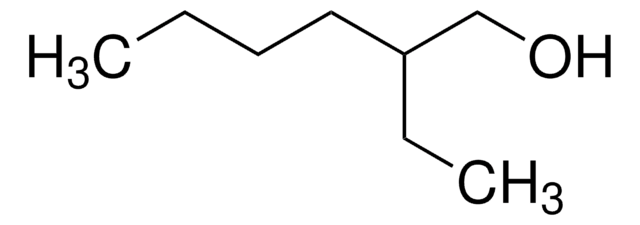03351
Diethylene glycol monobutyl ether
for surfactant analysis, ≥99.0%
Synonym(s):
2-(2-Butoxyethoxy)ethanol, BDG, Butyldiglycol
Sign Into View Organizational & Contract Pricing
All Photos(1)
About This Item
Linear Formula:
CH3(CH2)3OCH2CH2OCH2CH2OH
CAS Number:
Molecular Weight:
162.23
Beilstein:
1739225
EC Number:
MDL number:
UNSPSC Code:
12164500
PubChem Substance ID:
NACRES:
NA.21
grade:
for surfactant analysis
Assay:
≥99.0% (GC)
≥99.0%
≥99.0%
bp:
224-228 °C (lit.)
Recommended Products
grade
for surfactant analysis
Quality Level
Assay
≥99.0% (GC)
≥99.0%
form
liquid
impurities
≤0.1% water
refractive index
n20/D 1.432
bp
224-228 °C (lit.)
density
0.953 g/mL at 20 °C (lit.)
SMILES string
CCCCOCCOCCO
InChI
1S/C8H18O3/c1-2-3-5-10-7-8-11-6-4-9/h9H,2-8H2,1H3
InChI key
OAYXUHPQHDHDDZ-UHFFFAOYSA-N
Looking for similar products? Visit Product Comparison Guide
Application
- Optimal Design of Alkaline-Surfactant-Polymer Flooding under Low Salinity Environment: Research highlights the use of diethylene glycol monobutyl ether in enhancing the efficiency of enhanced oil recovery methods, particularly in low salinity environments. This application points to its potential in reducing the environmental footprint of oil extraction processes (Novriansyah A, et al., 2020).
- Bioaugmentation for treatment of full-scale diethylene glycol monobutyl ether (DGBE) wastewater by Serratia sp. BDG-2: Demonstrates the solvents biodegradability and the potential for its removal from wastewater using specific bacterial strains, highlighting important environmental safety considerations (Chen M, et al., 2016).
- Diethylene glycol mono butyl ether concentrations in room air from application of cleaner formulations to hard surfaces: Examines the air quality implications of using diethylene glycol monobutyl ether in cleaning products, stressing the importance of monitoring and managing indoor air pollutants in industrial and domestic environments (Gibson WB, et al., 1991).
Signal Word
Warning
Hazard Statements
Precautionary Statements
Hazard Classifications
Eye Irrit. 2
Storage Class Code
10 - Combustible liquids
WGK
WGK 1
Flash Point(F)
210.2 °F - closed cup
Flash Point(C)
99 °C - closed cup
Personal Protective Equipment
dust mask type N95 (US), Eyeshields, Gloves
Choose from one of the most recent versions:
Already Own This Product?
Find documentation for the products that you have recently purchased in the Document Library.
Customers Also Viewed
Hypersensitivity to 2-(2-butoxyethoxy)ethanol.
K Berlin et al.
Contact dermatitis, 32(1), 54-54 (1995-01-01)
E D Thompson et al.
Environmental health perspectives, 57, 105-112 (1984-08-01)
The mutagenic potential of diethylene glycol monobutyl ether (diEGBE) was examined with a Tier I battery of in vitro assays followed by a Tier II in vivo Drosophila sex-linked recessive lethal assay. The in vitro battery consisted of: the Salmonella
José H J Gijsbers et al.
The Annals of occupational hygiene, 48(3), 219-227 (2004-04-03)
Limited quantitative information is available on dermal exposure to chemicals during various industrial activities. Therefore, within the scope of the EU-funded RISKOFDERM project, potential dermal exposure was measured during three different tasks: filling, loading and brushing. DEGBE (2-(2-butoxyethoxy)ethanol) was used
W B Gibson et al.
Journal of exposure analysis and environmental epidemiology, 1(3), 369-383 (1991-07-01)
Diethylene glycol monobutyl ether (DGBE) is a solvent used in some liquid hard surface cleaners. We evaluated the inhalation component of consumer exposure in the home to DGBE from the use of cleaning products containing up to 9% DGBE. Several
M M Udden
Toxicology letters, 156(1), 95-101 (2005-02-12)
The toxicity of diethylene glycol butyl ether (DGBE), and its principal metabolite, butoxyethoxyacetic acid (BEAA), were assessed in vitro for rat and human red blood cells. Rat erythrocytes showed evidence of mild hemolysis when exposed to BEAA at concentrations of
Our team of scientists has experience in all areas of research including Life Science, Material Science, Chemical Synthesis, Chromatography, Analytical and many others.
Contact Technical Service












